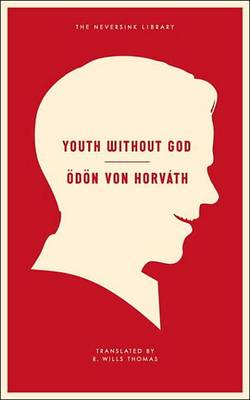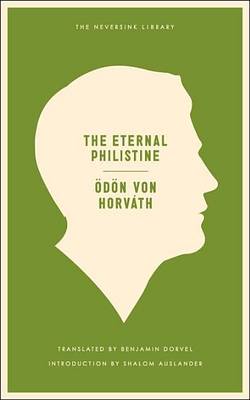Neversink
2 total works
Written in exile while in flight from the Nazis, this dark, bizarre evocation of everyday life under fascism is available for the first time in thirty years.
This last book by Ödön von Horváth, one of the 20th-century’s great but forgotten writers, is a dark fable about guilt, fate, and the individual conscience.
An unnamed narrator in an unnamed country is a schoolteacher with “a safe job with a pension at the end of it.” But, when he reprimands a student for a racist comment, he is accused of “sabotage of the Fatherland,” and his students revolt. A murder follows, and the teacher must face his role in it, even if it costs him everything.
Horváth’s book both points to its immediate context—the brutalizing conformity of a totalitarian state, the emptiness of faith in the time of the National Socialists—and beyond, to the struggles of individuals everywhere against societies that offer material security in exchange for the abandonment of one’s convictions. Reminiscent of Camus’ The Stranger in its themes and its style, Youth Without God portrays a world of individual ruthlessness and collective numbness to the appeals of faith or morality.
And yet, a commitment to the truth lifts the teacher and a small band of like-minded students out of this deepening abyss. It’s a reminder that such commitment did exist in those troubled times—indeed, they’re what led the author to flee Germany, first for Austria, and then France, where he met his death in a tragic accident, just two years after the publication of Youth Without God. Long out of print, this new edition resurrects a bracing and still-disturbing vision.
“Horváth was telling the truth. Furiously.” —Shalom Auslander
This last book by Ödön von Horváth, one of the 20th-century’s great but forgotten writers, is a dark fable about guilt, fate, and the individual conscience.
An unnamed narrator in an unnamed country is a schoolteacher with “a safe job with a pension at the end of it.” But, when he reprimands a student for a racist comment, he is accused of “sabotage of the Fatherland,” and his students revolt. A murder follows, and the teacher must face his role in it, even if it costs him everything.
Horváth’s book both points to its immediate context—the brutalizing conformity of a totalitarian state, the emptiness of faith in the time of the National Socialists—and beyond, to the struggles of individuals everywhere against societies that offer material security in exchange for the abandonment of one’s convictions. Reminiscent of Camus’ The Stranger in its themes and its style, Youth Without God portrays a world of individual ruthlessness and collective numbness to the appeals of faith or morality.
And yet, a commitment to the truth lifts the teacher and a small band of like-minded students out of this deepening abyss. It’s a reminder that such commitment did exist in those troubled times—indeed, they’re what led the author to flee Germany, first for Austria, and then France, where he met his death in a tragic accident, just two years after the publication of Youth Without God. Long out of print, this new edition resurrects a bracing and still-disturbing vision.
“Horváth was telling the truth. Furiously.” —Shalom Auslander
This never-before translated work by a major yet overlooked mid-20th century writer is a brutally funny look at the human comedy on the eve of Europe's decent into Fascism.
It tells the tale of a failed used car salesman who wants to live the high life, and so decides to travel by train from Munich to Barecelona to attend the World's Fair — in hopes of meeting a beautiful, rich woman who will provide for his every whim.
It's a highly-stylized and, at times, raucously funny tale of the almost-absurd: a dark and satiric look at Europeans, and especially Germans, on the brink of cataclysm. Adrift in their acquisitive desires, they are vulnerable to the propaganda of the State — making this novel brilliantly foresightful in its understanding of politics and human nature at a crucial point in modern history.
Ödön von Horváth’s scathing insight, in fact, led to his having to flee the very society he depicted when, living in Berlin, he drew the wrath of the Nazis. And yet this hilarious tour-de-force — written just after his escape, and just before his death in a tragic accident — eschews bitterness for rambunctious perseverance and compassion, and provides ample evidence of why von Horváth deserves renewed appreciation.
It tells the tale of a failed used car salesman who wants to live the high life, and so decides to travel by train from Munich to Barecelona to attend the World's Fair — in hopes of meeting a beautiful, rich woman who will provide for his every whim.
It's a highly-stylized and, at times, raucously funny tale of the almost-absurd: a dark and satiric look at Europeans, and especially Germans, on the brink of cataclysm. Adrift in their acquisitive desires, they are vulnerable to the propaganda of the State — making this novel brilliantly foresightful in its understanding of politics and human nature at a crucial point in modern history.
Ödön von Horváth’s scathing insight, in fact, led to his having to flee the very society he depicted when, living in Berlin, he drew the wrath of the Nazis. And yet this hilarious tour-de-force — written just after his escape, and just before his death in a tragic accident — eschews bitterness for rambunctious perseverance and compassion, and provides ample evidence of why von Horváth deserves renewed appreciation.

